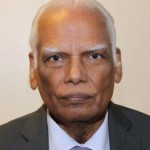Modi Tells Neighbouring Countries India Means Business
By Veluppillai Thangavelu -June 2, 2014
 Like the adage from rags to riches Narendra Modi, a sutra by birth, has been anointed as the 14th Prime Minister of India on May 26th in a lavish ceremony that became a public relations coup for the new leader. It was attended by over 4,000 dignitaries including SAARC leaders. Modi Mania griped India ahead of the swearing-in ceremony.
Like the adage from rags to riches Narendra Modi, a sutra by birth, has been anointed as the 14th Prime Minister of India on May 26th in a lavish ceremony that became a public relations coup for the new leader. It was attended by over 4,000 dignitaries including SAARC leaders. Modi Mania griped India ahead of the swearing-in ceremony.
Those who thought that the inaugural ceremony will be kept at a low key were proved wrong. Probably Modi wanted to convey the message right from day one that his style of governance will be different from the corruption riddled and dysfunctional Congress led government of Sonia Gandhi and Manmohan Singh.
If the swearing-in ceremony was fat and pomp, Modi’s cabinet looked slim and trim. Some states like Thamil Nadu, Andhra Pradesh, Bengal and Northeast got short shrift and there is just one Muslim. But there are plenty of women at the top. A general rule was followed, a Ministership for every ten members of parliament from a particular state.
As widely predicted Modi has settled for a cabinet of 46 ministers with only 24 holding cabinet rank. This was a historic change in the formation of Ministries. The fact BJP is dominated by Brahmin – Bania castes is no secret. This is reflected in the composition of the cabinet. Obviously Modi did not break with tradition when it came to caste. Various upper castes, like Brahmins, Rajputs, Kayasthas and Vaishyas in the north or socially dominant communities like Lingayats, Vokkaligas and Marathas account for 20 of the 46 ministerial berths. OBCs have 13, tribals 6 and dalits three.
Only three of the 46 ministers can clearly be identified as non-Hindus – Harsimrat Kaur Badal, a Sikh, and Najma Heptulla, a Muslim. Two others – Smriti Irani and Maneka Gandhi – are difficult to define by caste/community. What is interesting is how the caste mix changes across different levels of responsibility. Among the 24 Cabinet members (including Modi), 12 are upper caste, five OBC, two Dalit and one a tribal.
Interestingly enough of the 47 ST-reserved seats in the Lok Sabha, BJP won 26 and its allies another two. Compared to the tribals Dalits fared badly with just 3 berths compared to a share of about 15% -16 % in the country’s population. Of the 87 such Lok Sabha constituencies, BJP alone won 40 and its allies like Shiva Sena, LJP and TDP won another nine. To put it differently, the Dalits voted for the BJP/NDA combine knowing well the in-built domination by the upper caste. Read More

